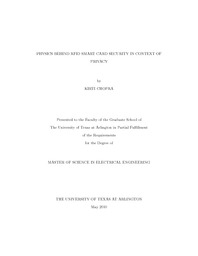
ATTENTION: The works hosted here are being migrated to a new repository that will consolidate resources, improve discoverability, and better show UTA's research impact on the global community. We will update authors as the migration progresses. Please see MavMatrix for more information.
Show simple item record
| dc.contributor.author | Chopra, Kirti | en_US |
| dc.date.accessioned | 2010-07-19T19:55:03Z | |
| dc.date.available | 2010-07-19T19:55:03Z | |
| dc.date.issued | 2010-07-19 | |
| dc.date.submitted | January 2010 | en_US |
| dc.identifier.other | DISS-10684 | en_US |
| dc.identifier.uri | http://hdl.handle.net/10106/4948 | |
| dc.description.abstract | In this thesis I prove that existing HF protocol is not secure. Lack of security in turn leads to violation of privacy.The unique ID on the HF RFID smart card can be sniffed by any eavesdropper. Not only eavesdropping, but cloning of the card is another significant problem that poses a privacy threat. An attacker can skim the information on a proximity card and clone it to use for his malicious purposes.RFID smart cards are now widely being used in credit cards,access system, transit system and many more such application. Tampering or malicious usage of data on aforementioned cards raises security and privacy concern.HF RFID system works wirelessly with no line of sight.Its advantage speaks for its weakness. This wireless communication happens on a protocol. Precisely, it's the communication protocol that is more vulnerable to security attacks. There are a lot of HF protocols in use today but, I have looked into ISO 14443. The attacks possible on the card could be a relay attack, eavesdropping, skimming to name a few.This thesis focuses on skimming and eavesdropping attack. | en_US |
| dc.description.sponsorship | Engels, Daniel | en_US |
| dc.language.iso | EN | en_US |
| dc.publisher | Electrical Engineering | en_US |
| dc.title | Physics Behind RFID Smart Card Security In Context Of Privacy | en_US |
| dc.type | M.Engr. | en_US |
| dc.contributor.committeeChair | Engels, Daniel | en_US |
| dc.degree.department | Electrical Engineering | en_US |
| dc.degree.discipline | Electrical Engineering | en_US |
| dc.degree.grantor | University of Texas at Arlington | en_US |
| dc.degree.level | masters | en_US |
| dc.degree.name | M.Engr. | en_US |
Files in this item
- Name:
- Chopra_uta_2502M_10684.pdf
- Size:
- 2.030Mb
- Format:
- PDF
This item appears in the following Collection(s)
Show simple item record


